Stara Moravica
Stara Moravica (Serbian Cyrillic: Стара Моравица; Hungarian: Bácskossuthfalva or Ómoravica; German: Alt-Morawitza) is a village located in the Bačka Topola municipality, in the North Bačka District of Serbia. It is situated in the Autonomous Province of Vojvodina. The village has a Hungarian ethnic majority and its population numbering 5,699 people (2002 census).
Stara Moravica
| |
|---|---|
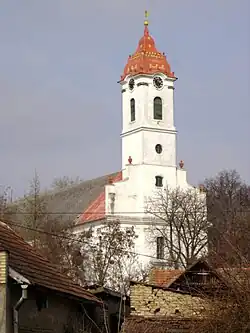 The Calvinist church. | |
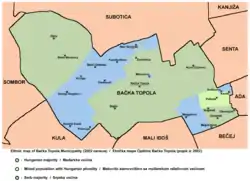 Map of the Bačka Topola municipality showing the location of Stara Moravica | |
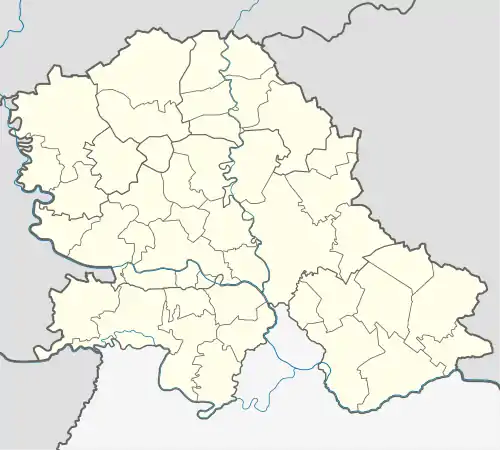 Stara Moravica  Stara Moravica 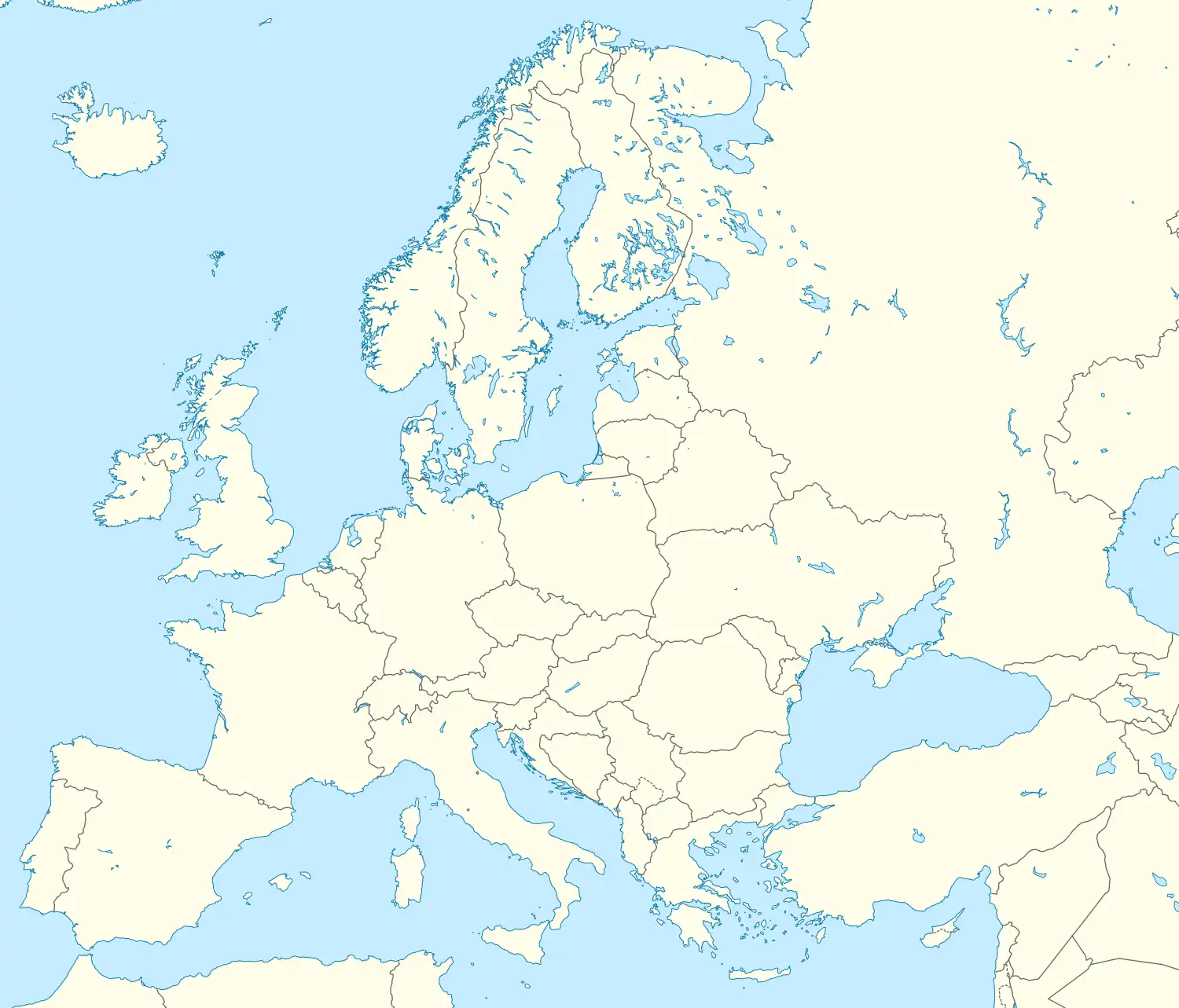 Stara Moravica | |
| Coordinates: 45°52′8″N 19°27′58″E | |
| Country | |
| Province | |
| Area | |
| • Total | 34.1 sq mi (88.3 km2) |
| Population (2002) | |
| • Total | 5,699 |
| Time zone | UTC+1 (CET) |
| • Summer (DST) | UTC+2 (CEST) |
Etymology
Its name has changed many times throughout history: or 20 versions can be listed. The story begins with the settlements of the Avar period: Okor, Omar, then Omarica, Omaricsa, Omorovics, Omarocsa. The name Omorovica appeared in Turkish times. Similar versions were included until the turn of the century: Omorovicza, Bács-Omorovicza, Ómorovicza. From 1907 Kossuthfalva and from 1912 Bácskossuthfalva was the official name of the village.
History
Between 1782 and 1786, Hungarians settled in Stara Moravica.
Geography
It is situated halfway between Belgrade and Budapest in a geographical region of Bačka.
Map coordinates: 45°52′8″N 19°27′58″E.
Climate
| Month | Jan | Feb | Mar | Apr | May | Jun | Jul | Aug | Sep | Oct | Nov | Dec | Year |
|---|---|---|---|---|---|---|---|---|---|---|---|---|---|
| Average high °F (°C) | 36 (2) |
40 (4) |
51 (11) |
60 (16) |
70 (21) |
75 (24) |
79 (26) |
79 (26) |
73 (23) |
61 (16) |
46 (8) |
38 (3) |
59 (15) |
| Average low °F (°C) | 26 (−3) |
28 (−2) |
34 (2) |
43 (6) |
52 (11) |
58 (14) |
60 (16) |
60 (16) |
54 (12) |
44 (7) |
35 (2) |
29 (−2) |
44 (6.6) |
| Average precipitation inches (mm) | 1.1 (28) |
1.1 (28) |
1.1 (28) |
1.6 (41) |
2.1 (53) |
2.7 (69) |
2.1 (53) |
2.0 (50) |
1.5 (38) |
1.3 (33) |
1.7 (43) |
1.6 (41) |
19.9 (505) |
| Source: [1] | |||||||||||||
Demographics
| Year | Pop. | ±% |
|---|---|---|
| 1931 | 8,034 | — |
| 1948 | 6,919 | −13.9% |
| 1953 | 6,682 | −3.4% |
| 1961 | 6,904 | +3.3% |
| 1971 | 6,737 | −2.4% |
| 1981 | 6,449 | −4.3% |
| 1991 | 6,266 | −2.8% |
| 2002 | 5,699 | −9.0% |
| 2011 | 5,013 | −12.0% |
Stara Moravica had a population of 5,699 in 2002. The village has been declining in population since the 1960s. In 1991, there were 6,266 people, 5,576 Hungarians, 278 Serbs, and 412 persons of other ethnicities.[2] However, by 2002, the population had decreased to 5,699, with 4,975 Hungarians, 505 Serbs, and 219 persons of other ethnicities.[2]
Religion
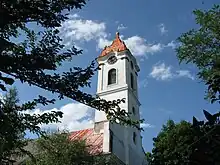
Stara Moravica has two churches: one Catholic and one Calvinist Protestant.[2]
Culture
The village celebrates several festivals throughout the year: the annual Village Fair in May, the Beer Festival in August, the Grape Picking Festival in September, the Fall Harvest Festival in October, the Honey Festival in November, and the Village Celebration in December.[3]
There is an artist colony in Stara Moravica that attracts artists from all over the world for a few weeks. In addition, the village has one of the largest art collections in the Vojvodina province and has a Cultural House.[3]
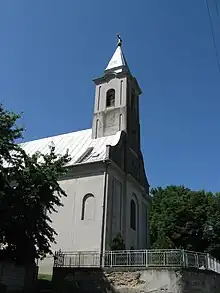
In popular culture
Stara Moravica was featured on the HGTV series House Hunters International Renovation.[4][5]
See also
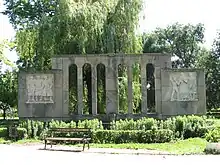
References
- "Stara Moravica Serbia|What". Retrieved June 10, 2016.
- "Bácskossuthfalva". Retrieved 10 June 2016.
- "Stara Moravica Serbia | What". www.staramoravicaserbia.com. Retrieved 2016-06-10.
- "Stara Moravica Country Villa - Houses for Rent in Stara Moravica". Airbnb. Retrieved 2016-06-10.
- "Stara Moravica Serbia | Who". www.staramoravicaserbia.com. Retrieved 2016-06-10.
- Slobodan Ćurčić, Broj stanovnika Vojvodine, Novi Sad, 1996.
External links
- History of Stara Moravica (in Hungarian)
